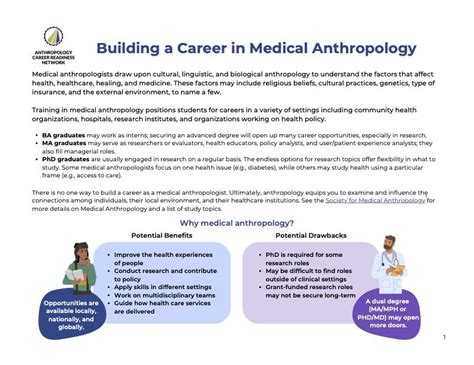Medical Anthropology Careers

Medical anthropology, a captivating field of study, explores the intricate relationship between culture, society, and health. It delves into how societal structures, beliefs, and practices influence human health and well-being, offering unique insights into the diverse ways communities perceive and manage illness and disease. For individuals fascinated by this intersection of medicine and anthropology, a career in medical anthropology can be incredibly rewarding, presenting opportunities to contribute to global health initiatives and make a meaningful impact on people's lives.
The Role of a Medical Anthropologist

Medical anthropologists are not just researchers; they are cultural mediators, advocates, and educators. Their work involves studying the cultural dimensions of health, illness, and healthcare systems, often in cross-cultural contexts. This field is particularly relevant in today's globalized world, where understanding diverse healthcare practices and beliefs is crucial for effective public health interventions.
A medical anthropologist might find themselves working with indigenous communities to understand traditional healing methods, collaborating with healthcare organizations to improve patient care, or conducting research to inform policy decisions. Their expertise is invaluable in designing culturally sensitive health programs, ensuring healthcare services are accessible and relevant to diverse populations.
Specializations and Expertise
Within the broad field of medical anthropology, professionals can specialize in various areas, such as cultural epidemiology, which focuses on the cultural factors influencing the spread and control of diseases. Others might concentrate on medical pluralism, exploring the coexistence of traditional and modern medical systems, or on the sociocultural aspects of specific diseases, such as HIV/AIDS or mental health disorders.
The depth of knowledge and the variety of applications in medical anthropology make it a dynamic and exciting field. Professionals in this area often possess a unique blend of cultural sensitivity, research skills, and an understanding of global health issues, allowing them to contribute to a wide range of projects and initiatives.
| Specialization Area | Description |
|---|---|
| Cultural Epidemiology | Studying the cultural factors influencing disease spread and control. |
| Medical Pluralism | Exploring the coexistence of traditional and modern medical systems. |
| Mental Health Anthropology | Examining cultural beliefs and practices related to mental health and illness. |
| Health Disparities Research | Investigating cultural and societal factors contributing to health inequalities. |

Education and Career Path

A career in medical anthropology typically requires advanced academic qualifications. Most professionals in this field hold a master's or doctoral degree in anthropology with a focus on medical or health-related topics. Undergraduate studies often include a strong foundation in social sciences, biology, and public health.
The career path for medical anthropologists is diverse. They may work in academic institutions, conducting research and teaching, or in non-governmental organizations (NGOs) and international health agencies, contributing to global health initiatives. Some professionals also find opportunities in the private sector, working with healthcare providers or insurance companies to improve patient experiences and outcomes.
Skills and Competencies
Successful medical anthropologists possess a unique skill set. They are adept at qualitative and quantitative research methods, with a strong ability to analyze and interpret complex cultural data. Effective communication skills are vital, as they often need to convey complex ideas to diverse audiences, from local communities to international health organizations.
Empathy and cultural sensitivity are core traits, enabling professionals to build trust and understanding with individuals and communities from various cultural backgrounds. Additionally, project management skills are valuable, especially when leading or contributing to research initiatives and health programs.
Impact and Contributions
The work of medical anthropologists has a profound impact on global health. By understanding the cultural context of health and illness, they can contribute to the design of more effective health interventions and policies. Their research and insights help bridge the gap between different cultural perspectives and modern medical practices, ensuring that healthcare services are culturally appropriate and accessible.
Medical anthropologists also play a crucial role in advocacy and education. They can help raise awareness about the social and cultural determinants of health, influence public health policies, and contribute to the development of culturally sensitive healthcare curricula. Their work is integral to promoting health equity and improving the overall well-being of communities worldwide.
Frequently Asked Questions
What are some common research areas in medical anthropology?
+
Medical anthropologists often study a wide range of topics, including cultural beliefs about illness, traditional healing practices, the impact of globalization on health, healthcare disparities, and the social determinants of health.
How do medical anthropologists contribute to healthcare policies and practices?
+
Their research provides crucial insights into the cultural factors influencing health and illness. This knowledge helps inform healthcare policies, ensuring they are culturally sensitive and effective for diverse populations. Medical anthropologists also play a role in designing healthcare programs and training healthcare providers to better understand and serve their patients.
What challenges do medical anthropologists face in their work?
+
One of the main challenges is navigating cultural differences and ensuring ethical research practices. Medical anthropologists must also stay updated with the latest advancements in both anthropology and healthcare to effectively contribute to interdisciplinary collaborations.



